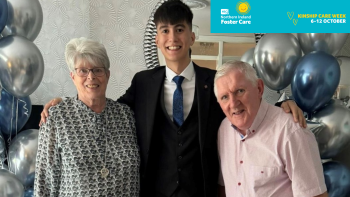9th October 2025

When Pearse and Margaret Quinn retired, they imagined quiet days and a slower pace of life. But life had other plans, plans that would change their circumstances for the better.
The couple, from within the Southern Health and Social Care Trust area, became kinship carers for their grandson Adam, a decision they describe as one of the most rewarding experiences of their lives.
“As we look back on our time as kinship carers, the first word that comes to mind is how incredibly interesting the experience has been. Honestly, we’ve enjoyed every minute of it!”
As part of Kinship Care Week (6-10 October) the Trust have been shining a spotlight on the extraordinary role of kinship foster carers and celebrating their success in keeping families and communities together.
Taking on the role after retirement was a big change, but the Quinns say the support from their social workers and the Trust made all the difference.
“That positive outcome is truly a testament to the support we’ve received. Stepping into this role from retirement was a big change, and we quickly learned how important it is to have a dedicated support system in place.”
They are full of gratitude for their social workers, Emer and Amanda, and the wider Trust team.
“We want to thank our amazing social workers, Emer and Amanda, and everyone at the Trust. The guidance and dedication from both were a massive help along the way.”
Their advice to others considering kinship care is simple.
“Definitely go ahead with it. We had such a good experience that, had we been younger, we would have carried on with it for many more years. That should tell you everything you need to know about how rewarding it is.”
For Pearse and Margaret, the greatest reward has been seeing Adam thrive.
“We are so incredibly proud that he has done so well in school, achieving all his goals in education and now at university studying Dentistry. We know that the care we provided gave him the foundation for that success. If we could do it all over again, we would. This rewarding experience has changed all our lives for the better.”
Now a university student studying Dentistry, Adam speaks with maturity and deep gratitude about being raised by his grandparents.
“It would be naive of me to pretend that I had a completely normal upbringing, because obviously, it wasn’t. For years, I deflected and shifted the conversation away from the topic. But as I’ve matured, I’ve come to understand who to tell, the friends I trust and who I feel comfortable with.”
He says kinship care gave him the stability to focus on what mattered most.
“Living with my grandparents under kinship care was truly a success story. They provided me with an environment that enabled me to excel in what I was passionate about — education. Living with them gave me the support I needed to pursue my goal of entering dental school.”
Adam hopes his story inspires other young people in kinship care.
“My main advice to any other children in kinship care is to be open – to a new lifestyle, a new home, and new opportunities. No matter what home life you have, that doesn’t limit you in what you want to do with your life. Be open to new possibilities and keep going.”
When asked what he’d say to his grandparents now, his words are filled with love.
“For nearly seven years, I lived with my grandparents, and they taught me so much. Now that I’ve moved away to study, I’ve truly realised they provided me with so much more than I could ever thank them for. Without their support and guidance, I would not be where I am today.”
Stella Kelly, Assistant Director of Corporate Parenting in the Trust, said:
“Kinship carers come from all walks of life. They are grandparents, aunts, uncles, siblings, family friends and even teachers − who provide fulltime care to children who cannot live at home because of child protection concerns.
“We want to say this to every kinship carer in the Southern Trust: what you are doing matters. Even when it feels invisible. Even when it feels thankless. Even when the stress eats you alive. You are giving a child safety. You are giving them love. You are giving them stability at a time when they need it most by keeping them connected to their family and their community.”




